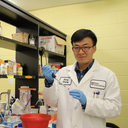The functions of serpin-3, a negative-regulator involved in prophenoloxidase activation and antimicrobial peptides expression of Chinese oak silkworm, Antheraea pernyi.
Atslēgvārdi
Abstrakts
Serpins are a superfamily of proteins engaged in various physiological processes in all kingdoms of life. To date, many striking results have demonstrated serpins are involved in the invertebrate immune system by regulating the proteolytic cascades. However, in most insect species, the immune functions of serpins in response against pathogen invasion remain obscure. In this study, we identified a full-length cDNA sequence of serpin, named serpin-3, from the Chinese oak silkworm Antheraea pernyi. Sequence alignments have indicated that Apserpin-3 might regulate the melanization reaction via inhibiting prophenoloxidases-activating protease(s) in plasma. Furthermore, it was detected to be primarily transcribed within the fat body, epidermis and hemocytes with significant induction following immune-challenge. Further studies have shown that the knockdown of serpin-3 up-regulated the prophenoloxidases cascade stimulated by pathogen in hemolymph, while the addition of recombinant serpin-3 along with the same elicitor led to the suppressed activation of prophenoloxidase. Besides, the injection of dsRNA of serpin-3 caused the elevated expression of antimicrobial peptides. Altogether, we arrived at a conclusion that serpin-3 might act as a negative-regulator in prophenoloxidases activation and inhibit the production of antimicrobial peptides in Antheraea pernyi larvae.


